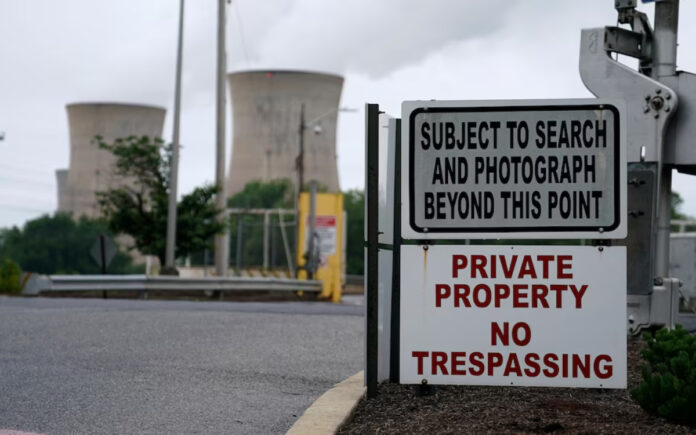New York: Microsoft’s plan to restart the Three Mile Island nuclear reactor to support its expanding data centers reflects the tech industry’s interest in nuclear energy as a potential quick, climate-friendly solution to its growing electricity demands. However, meeting the massive power needs of artificial intelligence (AI) data centers with nuclear energy will face significant challenges, including regulatory hurdles, fuel supply concerns, and opposition from environmental and local groups.
On Friday, Microsoft and Constellation Energy announced an agreement to restart a unit at the Three Mile Island nuclear plant in Pennsylvania. This would mark the first time a nuclear reactor has been used to power a data center. Constellation’s CEO, Joe Dominguez, emphasized that nuclear energy is the only reliable and climate-friendly power source that can meet Big Tech’s energy demands, implying that renewable energy sources such as wind and solar may not be sufficient.
This follows a similar deal in March when Amazon agreed to power its data centers with nuclear energy through a partnership with Talen Energy. Other nuclear contracts are also in development, according to industry sources, reflecting the tech sector’s growing interest in nuclear energy.
The power demands these agreements aim to address are immense. Goldman Sachs estimates that U.S. data center energy consumption will triple between 2023 and 2030, requiring around 47 gigawatts of additional power generation. With rising concern over greenhouse gas emissions, both investors and regulators are focused on ensuring that this energy surge doesn’t lead to significant increases in emissions.
Despite the potential, Microsoft and Constellation’s plan to restart the Three Mile Island reactor faces obstacles. “Nobody has done this before,” said Kate Fowler, global nuclear energy leader at Marsh, an energy insurance broker, regarding the effort to restart the reactor.
Three Mile Island is infamous for its 1979 partial meltdown at the Unit 2 reactor, the worst nuclear incident in U.S. history. The current project involves the restart of Unit 1, which operated safely until its closure five years ago. The $1.6 billion initiative aims to have Unit 1 operational by 2028, helping offset Microsoft’s data center energy consumption in the region. However, key regulatory permits for the project have not yet been submitted, and opposition from local communities remains a significant concern.
Reactivating equipment that has been dormant for five years also poses technical challenges. “Constellation should expect to encounter problems that will be costly and time-consuming to fix,” warned Edwin Lyman, a nuclear safety expert at the Union of Concerned Scientists. Additional concerns include the need for modified surface and groundwater permits, which will undergo thorough review for environmental sustainability, according to Stacey Hanrahan, spokesperson for the Susquehanna River Basin Commission.
Also Read | Climate Change Makes Central European Floods Twice as Likely
Additional Challenges
Beyond Three Mile Island, broader issues could affect nuclear partnerships with tech companies across the U.S. Restrictions on enriched uranium imports, imposed by Washington after Russia’s 2022 invasion of Ukraine, may complicate fuel supplies. Additionally, the U.S. Nuclear Regulatory Commission (NRC) is already handling a backlog of applications for new reactors, including high-tech modular plants and restarts of decommissioned reactors, which could delay approvals.
Despite recent efforts by President Joe Biden to streamline the NRC’s licensing process, the sheer number of new nuclear projects in the pipeline will likely stretch the agency’s resources, noted nuclear engineer Sola Talabi, president of Pittsburgh Technical. He added that community engagement would be critical, especially at sites like Three Mile Island, which has a controversial history.
Also Read | Second Peace Summit on Ukraine: Zelenskyy Invites India and Global Leaders to Join
For instance, while the Talen Energy project to power Amazon’s data centers is operational, it faces opposition from regulated utilities, who argue that it could increase transmission costs, leading to higher power bills for the public. Talen disputes these claims, but the debate highlights the potential financial impacts of nuclear-powered data centers on surrounding communities.
The restart of Three Mile Island will be a crucial test of public acceptance for expanding nuclear energy in the U.S. Talabi believes Constellation can resolve technical issues within four years but stresses that addressing environmental and community concerns is vital to gaining societal approval for the project. “More than anywhere else in the country, the need for community engagement to ensure societal acceptance will be critical for the restart,” he said.



